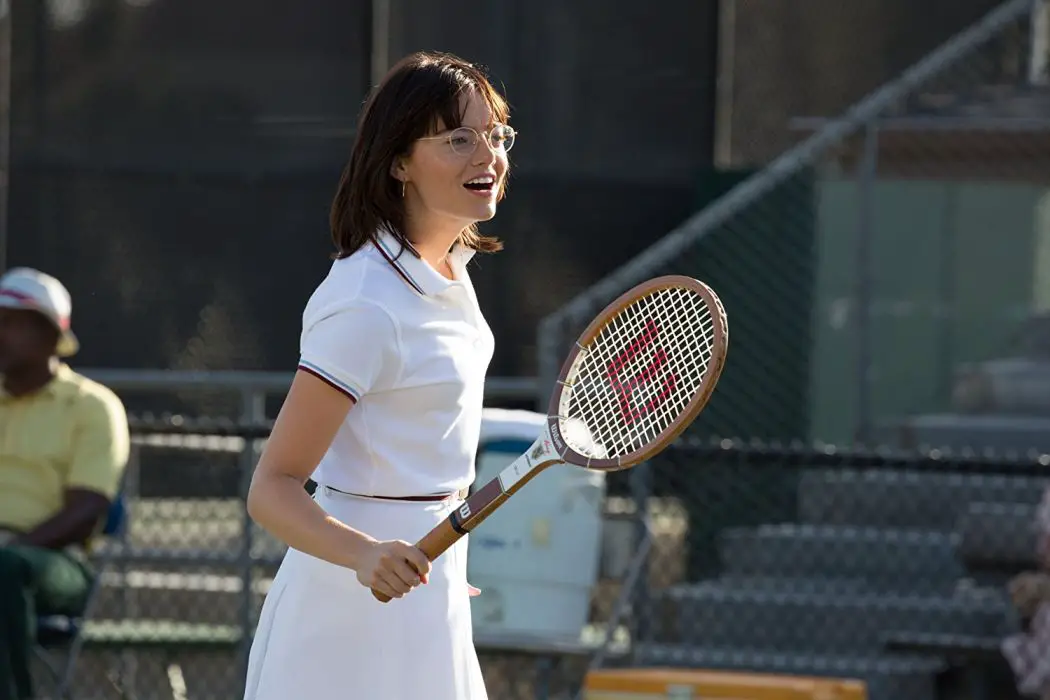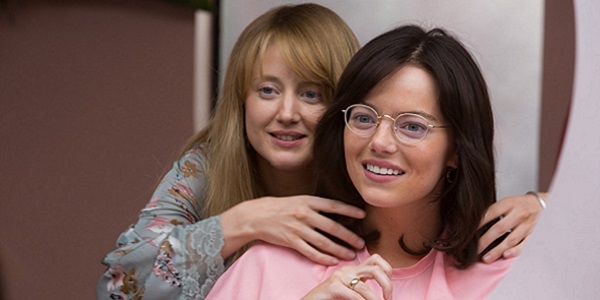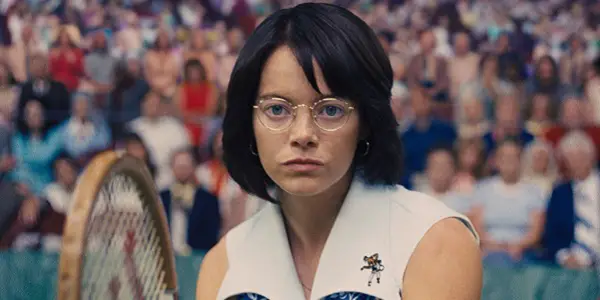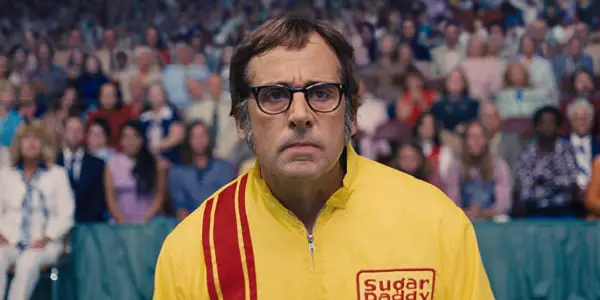BATTLE OF THE SEXES: An Empowering & All-Too-Timely True Story

Lee Jutton has directed short films starring a killer toaster,…
The year was 1973. She was the world’s top woman tennis player, struggling with both her fight for gender equality and her closeted sexuality. He was a former champion turned braggadocios hustler, obsessed with gambling to the point that he’d do anything if it might make him a quick buck or give him a big rush. That anything included reinventing himself as the showiest of chauvinists as he declared that, at the age of 55, he could still beat the best young women tennis players in the world just by virtue of being a man.
The notion that a mediocre man can top a fantastic woman just because he is a man remains all too timely 44 years after the infamous tennis match known as the Battle of the Sexes. One merely has to observe the outcome of the 2016 U.S. presidential election, or how successful women film directors struggle to get opportunities while certain men are given big budgets to direct flop after flop, to realize that in order to merely compete against ordinary men, women are forced to be extraordinary. Unfortunately for Bobby Riggs, no one was more extraordinary in 1973 than Billie Jean King.
Directors Jonathan Dayton and Valerie Faris, best known for the quirky smash hit Little Miss Sunshine, bring King’s infamous battle with Riggs to vivid, vintage-hued light in Battle of the Sexes with help from a transformative performance from Emma Stone as King and a poignant yet still sharply funny script from Slumdog Millionaire writer Simon Beaufoy. Yet the most powerful – and also the most depressing – thing about Battle of the Sexes is how relevant King’s struggle still is today.
Riding Into Battle With Billie
The film opens with King and the brash, chain-smoking founder of World Tennis magazine, Gladys Heldman (a scene-stealing Sarah Silverman), deciding to form a separate women’s tennis circuit after being continuously denied prize money equal to that of the men. It’s a ballsy move, but King and Heldman manage to convince eight other women to join up and, with funding from Philip Morris, the Virginia Slims Circuit is born.

While getting a makeover as part of the PR for the circuit, King meets a freewheeling hairstylist named Marilyn (Andrea Riseborough), and their connection is immediate and irresistible. Overcome with feelings she’s never felt before, King finds herself falling into bed with Marilyn, despite being married to a supportive puppy dog of a man, Larry (Austin Stowell).
The struggle to keep these revelations about her sexuality a secret, combined with the stress of leading the Virginia Slims tour, leads King’s play to suffer. After Margaret Court usurps King’s title as the women’s world number one, Riggs (Steve Carell) approaches her with his master plan. Maintaining that the women’s game is inferior to the men’s, he challenges Court to a tennis match, claiming that despite his advanced age, he’ll still win. When Riggs does come out on top, his gleeful bashing of all women tennis players fires King up enough for her to take on Riggs herself. For King, it’s so much more than $100,000 in prize money at stake – it’s the reputation of all of her fellow women tennis players, and their battle for equality both on and off the court.
The Woman In The Game: Emma Stone
As she was in La La Land, for which she earned a deserved first Academy Award last year, Emma Stone is the key to this film’s success. Indeed, her performance in Battle of the Sexes surpasses even her outstanding work in Damien Chazelle’s nostalgia-tinged musical; it should definitely earn her a second-straight nomination for Best Actress, if not another win. Sporting King’s signature dark shag and glasses, she disappears into the character more completely than she has in any of her previous roles.

Stone’s multifaceted performance conveys both King’s confidence in her considerable ability on the court and her self-doubt when it comes to her ability to actually change things for women in the game. She portrays King as a flawed, complex heroine, one who can’t help but hurt those around her when she places her first love – tennis – above all. By showing us King at both her greatest highs and her most disappointing lows, and how she was able to overcome the latter to achieve greatness nonetheless, Battle of the Sexes makes her even more admirable than if we had only seen her at her best. In seeing King at her weakest, we are able to appreciate how strong she truly is. It’s impossible not to root for her and to feel for her.
Colorful Characters In More Ways Than One
Stone might be the indisputable star, but that isn’t to say that the rest of the cast aren’t worthy counterparts. Carell brings his uniquely Michael Scott brand of buffoonery to Riggs, giving him enough rascally charm to elevate him from mere sexist sleazeball. It’s clear that it isn’t a desire to prove his superiority over women that drives Riggs, despite his frequent pronouncements of being a proud sexist pig; it’s merely a desire to bring excitement and meaning to his life in the twilight of his great career.
Like King, Riggs could have been easily – too easily – portrayed as an archetype, the mustache-twirling villain to King’s stout-hearted heroine. Fortunately, Beaufoy’s script and Dayton and Faris’ direction ensure that both characters are detailed with delicate touches instead of broad strokes.

The supporting cast – rounded out by well-placed comedians like Chris Parnell and Fred Armisen, not to mention Alan Cumming as King’s fashion designer – add just as much color to the story as the deliciously retro Adidas gear sported by most of the cast. Costume designer Mary Zophres, whose lengthy resume includes most of the Coen brothers’ movies and fashionable standouts like La La Land and Ghost World, deserves major credit for recreating the atmosphere of the era through perfectly placed items of clothing, whether it be Margaret Court’s mustard yellow and forest green dress from her battle with Riggs to the royal blue suede sneakers that King sports during the climactic standoff on the court. Indeed, the entire palette of the film, from the set design to the cinematography, is reminiscent of vintage magazine advertisements in color and tone. The look makes one feel as though one has truly traveled back in time to the 1970’s.
Just How Far Have We Come, Anyways?
However, it’s not just the deft performances and attention to period detail that makes one feel the authentic quality of Battle of the Sexes. It’s also the sad realization that, despite the accomplishments and activism of King over her storied career, women still have so much further to go to obtain equality – in sports and in life. Women today can respect King’ struggle, but we can also relate to it far more than one would like to admit. It’s a heartbreaking realization.
With each day bringing more headlines about men seeking to prove their dominance over women – in the boardroom, in the their doctor’s offices, on the Internet – one wonders if anyone learned anything from the original Battle of the Sexes. Maybe this time, the lessons will stick.
What do you think? Has society come a long way since the Battle of the Sexes, or do we remain stuck in patriarchal purgatory? Share your thoughts in the comments.
Battle of the Sexes was released in the U.S. on September 22, 2017 and will be released in the UK on November 24, 2017. You can find additional international release dates here.
Does content like this matter to you?
Become a Member and support film journalism. Unlock access to all of Film Inquiry`s great articles. Join a community of like-minded readers who are passionate about cinema - get access to our private members Network, give back to independent filmmakers, and more.
Lee Jutton has directed short films starring a killer toaster, a killer Christmas tree, and a not-killer leopard. Her writing has appeared in publications such as Film School Rejects, Bitch: A Feminist Response to Pop Culture, Bitch Flicks, TV Fanatic, and Just Press Play. When not watching, making, or writing about films, she can usually be found on Twitter obsessing over soccer, BTS, and her cat.













